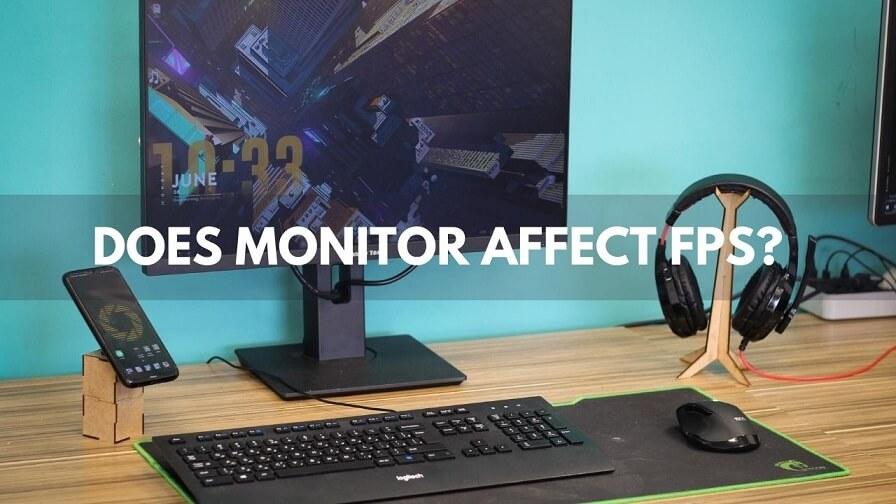We made this guide to answer a common question – Does Monitor Affect FPS?
True gaming experience only comes when you have a high-end monitor with great specifications.
But these days, searching for a good budgeted monitor is very tricky as there are lots of monitors with different specifications available in the market.
Some of them are good for ideal usages, and some of them are good for watching media ( consuming content ). And, some of them are good for gaming purposes.
But, there are lots of unanswered questions such as what are the things that make these monitors different from each other?
Today, in this article, I am going to explain everything related to gaming, and also I will tell you how frame rates and refresh rates are connected to each other.
Meanwhile, If you guys are planning to purchase the best all-rounder monitor for gaming purposes or dual monitor setup, then check out our recommended guide on 1440p 144hz Monitor.

Does Monitor Affect FPS?
 Many people think that monitors don’t affect frame rates while playing high-end games. And, that’s why most people do the same mistake that I did in the past.
Many people think that monitors don’t affect frame rates while playing high-end games. And, that’s why most people do the same mistake that I did in the past.
I invested a lot of money to build my own high-end CPU. Added some high-end SSDs, Graphic cards, RGB lights, Processors, etc, and due to this, soon I am running out of my budget, and after that, I don’t have enough funds to purchase a good monitor.
Related Guide: Monitor For Eye Health
So, at that time, I purchased one decent monitor, and as I have a high-end CPU so I think that it won’t affect my overall gaming experience.
But later on, I realized that I was completely wrong.
Whenever I install any high-end games such as Pubg PC or Fortnite, then I see lots of frame drops and also I will get some choppy screens. Later on, which started creating big problems.
At that time, I realized that I have to invest some more money in purchasing a monitor.
The monitor plays a very vital role in our PC setup and dual monitor setup. Later on, I decided to purchase one 144hz refresh rate monitor and now my setup works like a charm.
Purchasing a good monitor will help you to get a much better gaming experience even if you didn’t have such great configurations processors or graphic cards.
But the question arrives, how does low or higher fps affect? Let’s find out.
- Recommended guides:
Best Monitors With Small Bezel
What Is FPS ( Frames Per Second )
As you can easily understand by its full form, FPS stands for the number of frames per second.
Whenever you play games, It is much better to get higher fps so that you will get a clear image with good picture quality and zero frame drops.
Actually, FPS means how many slides / Images you will get in one second. Higher frames will deliver a much better gaming experience and whereas, if are getting low fps then it looks like your screen or screen resolution is stuck anywhere, or maybe looks too choppy while playing games.
What Is Refresh Rate?
Refresh rates are defined as the number of times, your monitor screen refreshes in one second.
This means, if you have a 75hz refresh rate monitor, then your monitor will refresh 75 times in one second.
Or, you can understand it in this way –
A 75hz refresh rates monitor means, that monitor will turn on and off 75 times in one second.
And, obviously, there is also the same concept. Higher the refresh rate, the higher the picture quality.
Now, you have some basic knowledge related to fps and refresh rate. But how they are connected to each other?
How Refresh Rates Can Impact FPS
Ahh. YES…
Refresh rates can impact FPS while gaming.
Let’s understand with an example.
Suppose your monitor has 75hz refresh rates. This means, your monitor is capable of showing 75 slides per second.
Now, If you try to play games on 90 fps then your CPU will render 90 frames per second but your monitor isn’t capable of showing more than 75 frames per second as it comes with 75 Hz refresh rates.
This means, rest of the frames are going to be ignored and you can only get a maximum of 75 frames per second on a 75hz refresh rates monitor.
That’s why for gamers, it is quite recommended to purchase 144hz refresh rates monitor as they are quite budget-friendly and you can get up to 144 frames per second while playing games.
Higher refresh rate monitors also look very good to the eyes. Check out our recommended guide on best monitors for eyes that protect your eyes from headaches eye fatigue.
Does Ram Affect FPS?
 Games required some amount of RAM to run games. And, this amount varies from game to game. Some of them might require a lot of RAM space whereas some of them required less amount of RAM Space.
Games required some amount of RAM to run games. And, this amount varies from game to game. Some of them might require a lot of RAM space whereas some of them required less amount of RAM Space.
Generally, FPS doesn’t depend upon the amount of RAM in your PC. But, if you have any old PC which runs on 2GB or 4GB of ram may cause frame drops and affect FPS while playing high resolutions games.
At that time, you should need to think about upgrading your RAM.
But, if your PC has already a decent amount of RAM, let’s say it is around 8 GB, then upgrading RAM won’t help you to increase FPS.
So, if you are building a new gaming PC with a decent budget, then 8GB of ram is more than enough to run high-performance shooting games.
FAQs
Can use multiple monitors, such as dual monitors, impact the frame rate (FPS) in games?
Yes, employing dual monitors or multiple monitors can increase the strain on the graphics card, potentially resulting in lower FPS and frame drops.
How does the monitor’s refresh rate relate to FPS?
The refresh rate of a monitor, which determines how frequently it updates the displayed image, doesn’t directly impact FPS in games. The FPS primarily relies on the capabilities of the GPU and other system components.
Does the monitor’s resolution affect FPS performance?
Absolutely, the monitor’s resolution can affect FPS performance. Higher resolution like 1440p or 4K demand more processing power from the GPU to render the increased number of pixels, potentially resulting in lower FPS compared to lower-resolution monitors.
How does connecting an external monitor affect gaming FPS?
Connecting an external monitor to a laptop or desktop computer can potentially impact gaming FPS. The additional display places an extra load on the GPU, increasing the rendering workload and possibly causing a drop in FPS.
What role does monitor size play in affecting FPS in games?
The monitor size itself doesn’t directly affect FPS in games. However, large monitor size often have higher resolutions, which can impact FPS due to the increased number of pixels requiring rendering. Additionally, larger monitors may demand more powerful GPUs to maintain high FPS in demanding games.
Conclusion
So, In the end, we can conclude that it is quite better to purchase a monitor with higher refresh rates.
It will help you to run games on much higher FPS and delivers much better picture quality than any other normal 60hz or 70hz refresh rates monitor.
For your Next PC Builds, make sure to maintain enough funds for a good monitor so that you will get an amazing gaming experience.
I hope, you guys found it helpful. Also for more monitors updates and guides, Stay connected with thebestmonitors.com
